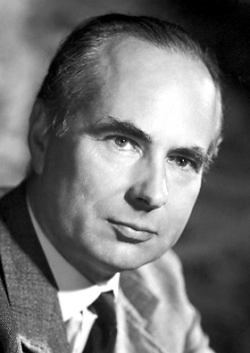Sir Andrew Fielding Huxley

- Born
- 22 November 1917
- Died
- 30 May 2012 (age 94)
Sir Andrew Huxley, Nobel laureate, master of Trinity Cambridge and president of the Royal Society, was one of the great scientific minds of the twentieth century. His breadth of knowledge and eye for designing specialist equipment helped pioneer research into nerve function.
Despite being a grandson of Thomas Henry Huxley, a champion of Charles Darwin, Huxley did not think it was inevitable he would always become a biologist.
From a young age Huxley showed a keen interest in scientific tools, particularly the microscope, his interest in design and assembly would continue to be a theme in his career. After studying at University College School and Westminster, Huxley went on to read natural sciences at Trinity College in Cambridge and by chance ended up focussing on physiology.
I had to do a third science, as well as the obvious subjects of maths, physics and chemistry. A chum of mine a few years older told me that physiology was a most vital subject and I would be learning things that were still controversial
After graduating, Huxley went on to work with Alan Hodgkin at the Marine Biological Association in Plymouth. Here they worked on the transmission of signals along neurons, utilising the size of the Atlantic squid to study these electrical impulses. Shortly after publishing a paper in Nature, their work was interrupted by World War II.
In 1946, Hodgkin and Huxley returned to Plymouth to continue their research into action potentials. Huxley’s ability to solve problems and skills in design meant that he was able to produce several unique pieces of equipment that allowed them to study the transmission of nerve impulses. The mathematical theory and detail that their work uncovered was completed in 1952 and published in a series of 5 papers. This ground breaking work resulted in Huxley sharing the Nobel Prize with Hodgkin and Eccles in 1963 for their discoveries concerning the ionic mechanisms involved in excitation and inhibition in the peripheral and central portions of the nerve cell membranes.
Huxley was editor of the Journal of Physiology from 1950 to 1956, and editor of the Journal of Molecular Biology. He was president of the Royal Society from 1980 to 1985 and was master of Trinity from 1984 to 1990, remaining a fellow of the College until his death.
This page was written by a Biology: Changing the World volunteer.



